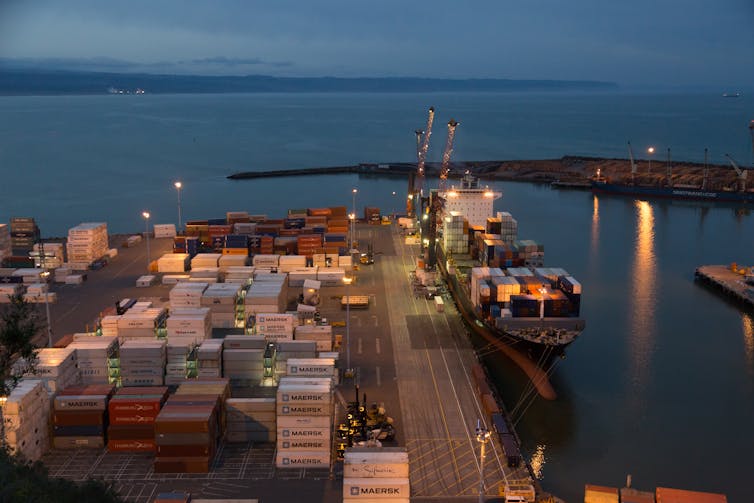NZ’s over-reliance on roads for freight means natural disasters hit even harder. But there is a fix
- Written by The Conversation

In the aftermath of Cyclone Gabrielle, the driving time between Napier and Wairoa stretched from 90 minutes to over six hours, causing major supply chain delays. Retail prices rose and shoppers faced empty shelves.
Natural hazards such as earthquakes and flooding can wreak havoc on Aotearoa New Zealand’s freight system. These crises can cause extensive road damage, isolating communities and creating disruptions in supply chain operations.
Cyclone Gabrielle was by no means a one-off. The 2021 flooding in Canterbury, for example, forced trucks to travel nearly 900 extra kilometres between Christchurch and Timaru, extending the travel time from two to 13 hours.
Severe weather events, the pandemic and the ongoing dispute about replacing the Cook Strait ferries have made the fragility of the freight system more apparent than ever.
To be fair, natural hazards are beyond our control. But resilience can be increased. Our new research identified the main vulnerabilities in the country’s freight system and analysed the factors leading to post-disaster disruptions and shortages on shelves.
The key to reducing freight disruptions, we found, is embracing and investing in the different ways goods can be moved around the country. In particular, using the thousands of kilometres of coastline offers another way to get items from one region to another.
Over-reliance on roads
New Zealand’s freight system is heavily reliant on roads, with trucks carrying close to 93% of the domestic freight tonnage.
But as they are currently organised, other potentially useful forms of transport such as rail and coastal shipping are not great alternatives. Non-road options run on timetables, for example, resulting in longer transit times.
And unlike road transport, which can move products directly between two points, rail and coastal shipping require multiple points of contact from where the goods are produced through to where they are sold.
As a result, when a disaster hits, alternative road routes are typically used to maintain freight deliveries. The limited alternatives in the road network and the lack of roads that can withstand heavy freight can cause problems for trucking companies. Both travel distances and transit times can increase.
When this happens, more trucks and drivers are needed, but these are already in short supply. The transport industry has been struggling to fill positions, with an estimated shortfall of thousands of drivers across the country.
This is compounded by the shortage of trucks, particularly specialised vehicles such as refrigerated units, which are essential for transporting perishable goods.
NZ’s long coastlines offer options
Government policy has a key role to play in addressing these problems and the lack of resilience in the national infrastructure system. In a country with long coastlines, reducing reliance on road transport and developing coastal shipping should be considered.
By shifting a portion of freight to coastal shipping, the demand for trucks and drivers can be reduced. This would also ensure reliable freight movements between the North and the South Islands when the ferry services are disrupted.
Finally, investing in coastal shipping would create a more flexible and resilient transport system where goods can shift rapidly from road to sea after a disaster.
Achieving this would require infrastructure improvements at our domestic seaports and additional vessels to increase the frequency of service. There would also need to be operational integration between road, rail and sea, with synchronised timetables for shorter transit times.
There will inevitably be another natural disaster that disrupts the freight system, causing delays, empty shelves and increased prices. Diversifying the transport options would increase resilience and keep those goods moving.







